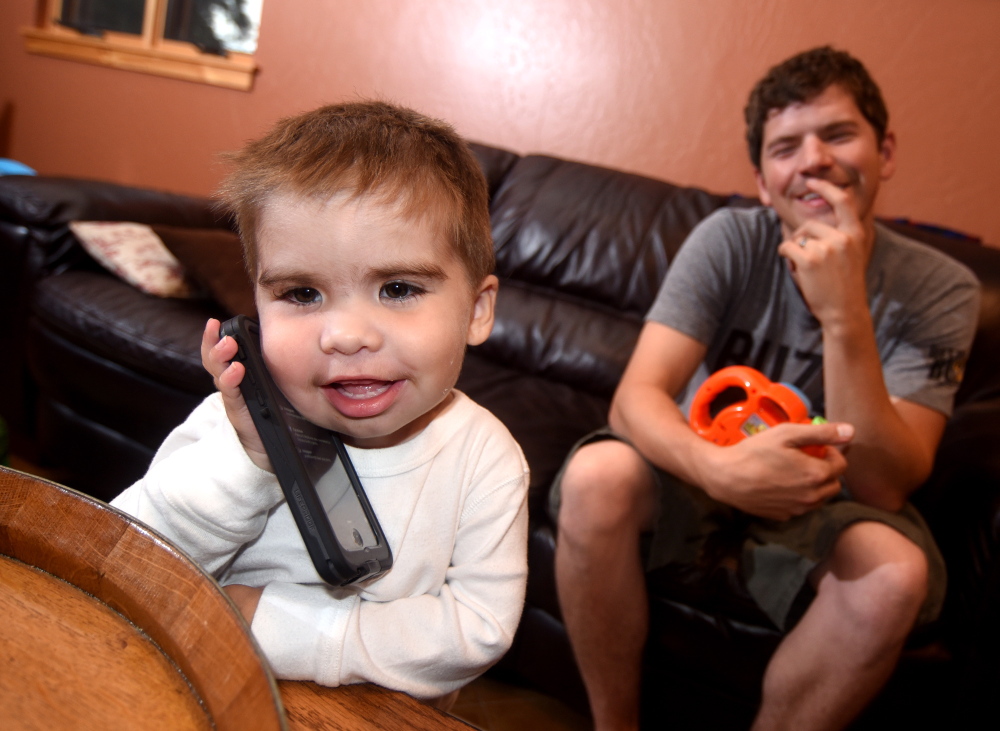DURANGO, Colo. — Liam Maddox, 21 months, is a lively, engaged toddler, checking out his dad’s cellphone, throwing a ball for his family’s Labrador retriever Desmond and trying to get his basketball in the mini-hoop.
But for his parents, Paul, 25, and Jaqueline “Jaci” Maddox, 22, he’s a walking miracle.
Their journey started when Liam came down with a cold in March 2014. Babies get colds all the time, don’t they?
But for Liam, 5 months old at the time, it turned out to be much more serious.
“We were in Alaska, and we figured it was just from flying,” his mother said. “But he was stuffed up and not getting better. We were turned away from the hospital three times, and two days later, when they finally admitted him, the doctors said he was one of the sickest babies they’d ever seen.”
The diagnosis was dilated cardiomyopathy, a disease of the heart muscle that keeps it from pumping as much blood as the body needs.
Before they knew it, they were at Seattle Children’s Hospital, where Liam was on life support for two weeks. He needed a new heart, but he couldn’t go on the transplant list until he was breathing on his own. Once on the list, it was an agonizing 15-day wait until a suitable heart was available.
At any given time in the United States, there are more than 120,000 people waiting for transplants according to the United Network for Organ Sharing. UNOS estimates someone is added to the waiting list every 10 minutes, and about 22 people die every day waiting for a transplant, so it was by no means a certainty that a pediatric-sized heart matched to Liam’s blood type and markers would be available in time.
“They said it was one of the quickest and smoothest heart transplants they had done, and the heart started right away,” Jaci Maddox said. “Two-and-a-half weeks later, he was discharged. He’s our first kid, and we didn’t know what to do anyway, and then this.”
Liam required anti-rejection medications every two hours, so the young couple took shifts round the clock. Jaci Maddox said, “We’ve settled into a rhythm. Two medications twice daily (into a port in Liam’s stomach), blood tests every two weeks. He’s gotten so used to those he doesn’t even cry anymore, which is sad to me.”
The Maddoxes check Liam’s heart rate every day and monitor how long he sleeps – sleeping too much can be a sign of heart failure.
A big challenge is keeping an active little boy away from germs, because the anti-rejection drugs work by suppressing Liam’s immune system.”If his temperature is over 101 degrees, he goes to the hospital,” Paul Maddox said. “I had an electrician comment on my gray hairs today, and I told him why.”
Send questions/comments to the editors.



Success. Please wait for the page to reload. If the page does not reload within 5 seconds, please refresh the page.
Enter your email and password to access comments.
Hi, to comment on stories you must . This profile is in addition to your subscription and website login.
Already have a commenting profile? .
Invalid username/password.
Please check your email to confirm and complete your registration.
Only subscribers are eligible to post comments. Please subscribe or login first for digital access. Here’s why.
Use the form below to reset your password. When you've submitted your account email, we will send an email with a reset code.